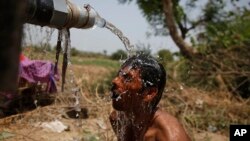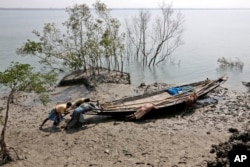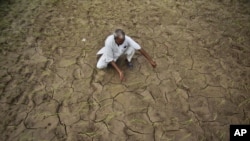A report released this week found that climate change is part of the reasons why Indian farmers are increasingly destitute and committing suicide.
Each year, 130,000 people die by suicide in India, many of them farmers in significant debt. This review of three decades of weather and suicide data marks the first effort to quantify the role that climate change may play in this crisis in India, where the suicide rate has doubled since 1980. And it is one of the first attempts to study the relationship between suicide and climate change.
Tamma Carleton, a PhD candidate at the University of California, Berkeley, wrote the report, published in the Proceedings of the National Academy of Sciences. She found that nearly 70 additional suicides would occur for each day and each degree Celsius of temperature rise. It's important to note that the effect only occurred during the growing season.
In total, Carleton estimates that climate change has contributed to 59,300 deaths in India over the past three decades, and accounts for 6.8 percent of the increase. The report is a stark reminder that humans have already begun to see the effects of climate change.
There have been previous attempts to quantify death toll from climate change, which is generally harder to quantify than effects like displacement due to sea-level rise. A 2015 report commissioned by the governments of 20 of the world’s most climate-vulnerable nations concluded that climate change was already killing 400,000 people each year though impacts like heat waves, communicable disease, flooding, and decreased crop yields.
But most of these efforts have either been focused globally or on developed countries, says Marshall Burke, assistant professor at Stanford University, who was not associated with the study. “One of the nice contributions here is that it’s a broad scale look at the country that’s going to have the largest global population,” he told VOA.
In examining the data, Carleton looked for signals that farmers were able to adapt in any way. For example, if they were more sensitive to short-term warming than long-term warming, that could indicate that farmers had been able to adapt over the long-term. But she found no evidence of any adaptation, and says there is a larger lesson to be learned from this.
“There’s a lot of optimism often about the future of climate because there’s sort of an assumption or a hope that we will adapt as the temperatures gradually warm,” she told VOA. “It hasn’t looked like it’s been easy to adapt in the past and so it’s concerning when we think about what this might mean for the future.”
Burke said researchers have looked for adaptation in other ways and that those results were consistent with what Carleton found.
While researchers have extensively investigated the effect that climate change has on the environment, this report is one of the first to consider how climate change may be affecting human populations. “There’s a lot of basic things about human responses to changes in climate that we still don’t understand, and that’s why I think papers like this are so important,” said Burke.
In 2015, an Indian farmer died after hanging himself outside a protest in New Delhi, drawing national attention to the issue and forcing a response by Prime Minister Narendra Modi. Protesters have since returned to the capital saying that campaign promises of crop insurance and loan forgiveness have not been met.
Carleton comes from a long line of farmers and as a child, most of her food came from the garden. “Growing my own food has been something that I’ve absolutely enjoyed… and it’s really heartbreaking to see that in many other parts of the world this occupation is so difficult and so stressful that some are choosing to commit suicide.”






